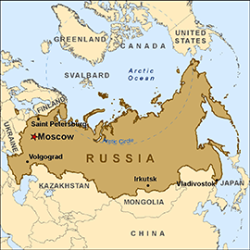Russian Online Poker To Be A Victim Of Ukraine Conflict?

In June 2009, the Russian Federation ordered the Sports Ministry to remove poker from its national sports registry, and since then the government has intermittently ordered Internet Service Providers to block online gambling websites from the country. Recently, however, Russian authorities signaled a U-turn in its negative approach towards iGaming after it requested the Russian Ministries of Finance, Economics and Justice to prepare a report on possible legalization, but now the prospects for online poker regulation appears to have dimmed once more following the heightened tensions between Russia and The West following the Ukraine Crisis which began on 21 February 2014.
Russian online poker a $150m industry
Russia is a country heavily reliant on the revenues generated from its energy sector, and in 2012 oil and gas accounted for 16% of the country’s GDP, around half its federal budget, and 70% of total exports. Therefore, its not difficult to see how online poker regulation could significantly impact the country’s economic outlook, especially with the industry predicted to generate up to 3 billion roubles ($87 million) in its first year of operation, rising to 5 billion roubles ($146 million) by year four.
With proposed amendments to the law suggesting a competitive taxation regime of 20% on a company’s gross gaming revenues and 13% on withdrawals made by poker players from their accounts, the government could stand to collect more than half a billion dollars in tax revenues over the next five years. Interestingly, chief researcher at the Centre for Tax Policy Research Institute of the Ministry of Finance, Vladimir Bauer, has indicated online poker would likely be categorized as an “intellectual and commercial game” so that it could be taxed as an electronic service.
Online poker legalization essential
Last month, a government ministries meeting concluded legalization of Russia’s online poker market was essential, with all arguments related to security and public safety subsequently dismissed. It was then decided the country’s interests could best be served by opening the industry to Western iGaming operators, and introducing a system whereby operators were required to store their customers’ personal data on servers hosted within Russia.
The country currently restricts all its gambling activities to five established gambling zones where casinos are permitted, but legislators even seemed positive towards allowing online poker to be offered outside of these far flung corners of the federation.
Online poker a victim of geopolitics?
While the Ukraine Crisis has been raging since February, recently the conflict involving Russia and The West has heightened following the introduction of a wave of sanctions against Russian individuals and businesses designed to impose a high cost on Russia’s aggression in Ukraine.
Given the current climate with The West, which threatens to draw a cold war era type “iron curtain” across Europe, it has become increasingly unlikely the Russian parliament will react positively to any new bill which would give Western businesses access to Russian online poker players. A more likely scenario may now involve legislators restricting online licenses to just existing domestic casino operators already operating inside Russia.
No real alternative to Western poker rooms
Although sending a strong message out to its political opponents, the move to exclude Western operators from Russia could ultimately be self-defeating in the absence of any real home grown competitor. Outside of the country, ex-Soviet Republic, Georgia, may represent the best option to bring online poker to Russia, with its poker site Adjarabet currently ranked on PokerScout‘s ‘Online Poker Traffic Report’ in 10th place with 1,000 cash game players over a seven-day-period, and Europe-Bet in 22nd place with 350 players.
Just like Ukraine, however, Russia has extremely hostile relations with Georgia and in 2008 it invaded South Ossetia in the north of the country, and has continued to occupy the region ever since. Creating “frozen conflicts” is widely seen as a tactic Russia employs in order to destabilize former USSR neighbors and keep them in its orbit of influence. Therefore, it’s anyone’s guess how long the stand-off between the West and Russia will last, and at which point a regulated online poker market may see the light of day in Russia.










